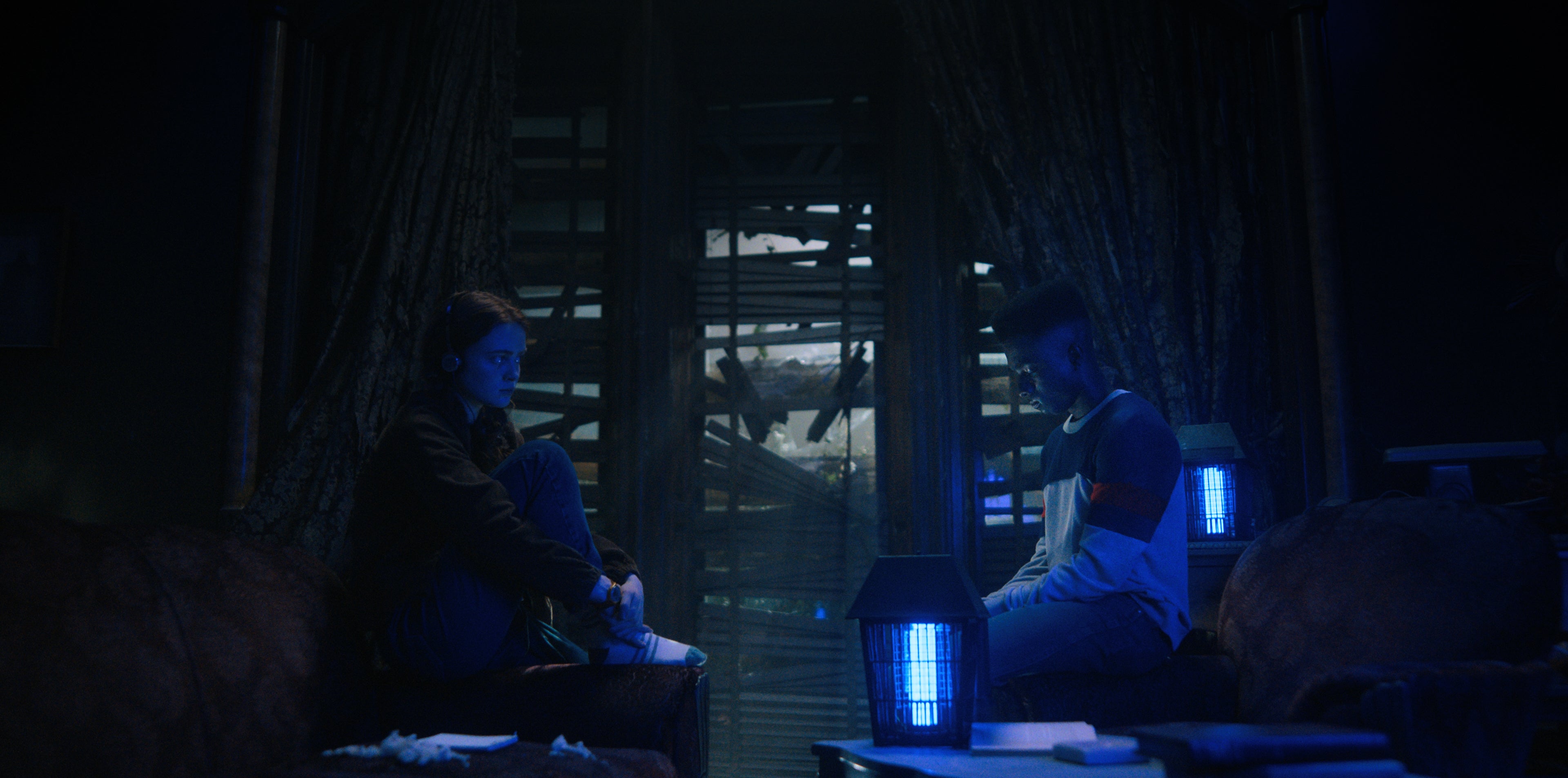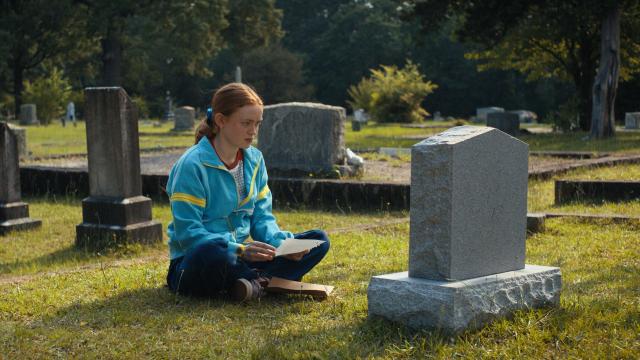“If you were presented with a life threatening situation, would you make an effort to save yourself?” That’s a question a therapist might ask you after you disclose suicidal ideation. It also happens to be the thesis statement of Max Mayfield’s journey through grief in the fourth season of Netflix’s Stranger Things. Max’s storyline is a poignant exploration of complex grief, but it’s also one that sends a dangerous message.
Stranger Things has always scratched an itch for me. I have fond memories of watching the entire first season in one sitting the day that it was released nearly eight years ago. I’ve always been deeply fascinated by the show’s Lovecraftian approach to science fiction, but the reason I gravitate toward the show with the release of every season is that it somehow manages to create and sustain characters that feel real and grounded in themselves whether the demons they are facing are interpersonal or otherworldly.
The show’s second season introduced Maxine “Max” Mayfield — played by newcomer Sadie Sink — a tomboy who moved from California to Hawkins, Indiana. Despite some initial turbulence, Max is able to find some respite from her unpleasant home life and aggressive (and arguably abusive) older half-brother Billy (Dacre Montgomery) by joining the show’s core group of tween heroes as they galavant across Hawkins battling the Upside Down. Max is painted as an island when we first meet her — she skateboards in solitude, she’s defensive, and she has no one to go trick-or-treating with — but by befriending the main cast, she finds a community to rely on and finally feel like she’s part of a family.

Two seasons and three in-show years later, Max is suffering nightmares and bouts of depression after witnessing Billy’s death at the hands of a monster from the Upside Down a few months prior. Max and her mother, who is now single and an alcoholic after splitting with Billy’s father, have moved into a trailer park across town. Max has also successfully pushed away her friends and boyfriend Lucas Sinclair (Caleb McLaughlin) while finding comfort in the heartbreaking lyrics of Kate Bush’s “Running Up That Hill,” which eerily mirror her experiences with grief. She’s an island again. Max is 15 years old in Stranger Things’ fourth season — around the age that I began experiencing depression, which I wouldn’t be formally diagnosed with for another five years. The funny thing about depression is that it’s amorphous: it’s not sadness, it’s just pain at its most primal and terrifying form. People with depression don’t push loved ones away out of contempt, we push them away because we’re tired, we’re scared, we’re hurting, and we’re trying to protect ourselves from further pain. We’re islands.
Depression has effects on the mind and the body. Lack of sleep and appetite are common physical symptoms, but mental illness also fundamentally changes a person’s brain chemistry, forcing you to see the world in a completely different way — almost like your own, personal Upside Down. This new world is scary and laborious. On good days navigating it is tiring, but on bad days existing in it is completely insufferable, and since our brains are operating differently, we can’t immediately see that the way out is therapy, or antidepressants, or our own social networks. Sometimes the only way out truly feels like death by our own hands.
Max’s depression becomes personified by Vecna, a teen-murdering villain from the Upside Down who has made Max his next target. Vecna zeroes in on her in the season four episode titled “Dear Billy,” and her proximity with dying gets smaller and smaller. Max leaves notes for her family and friends to open after she’s gone and rebuffs their attempts at support, explaining that she’s exhausted of people telling her that everything will be ok. Max also tearfully laments at Billy’s grave, wishing that she could’ve saved him from his death and grieving the potential of the loving brother-sister relationship they could have shared. It is then that Vecna, posing as a bloodied Billy, appears to Max and explicates the amalgamation of her trauma:
You know I think there’s a part of you buried somewhere deep that wanted me to die that day. That was maybe even relieved. Happy. That’s why you stood there isn’t it Max? It’s ok, you can admit it now. No more lies. No more hiding. That is why you feel such guilt, why you hide from your friends, why you hide from the world, and why late at night you have sometimes wished to follow me. Follow me into death.
These are tell-tale signs of someone readying to die by suicide: Max has a plan, she’s disconnecting from her social circles, and she feels an eerie sense of calm while accepting that death is the only solution to her current predicament. But when faced with certain demise, Max instead escapes Vecna’s noose-shaped tentacles in a cathartic sequence set to a symphonic rendition of “Running Up That Hill” — her favourite song. She’s not ready to die, and she chooses to save herself when faced with a life-threatening situation after remembering her reasons to live are her friends, the people that truly love her. She runs through the storm clouds and falling wreckage of Vecna’s lair toward their light, having overcome her darkest turmoil. She won.
Except she didn’t, because the storyline of Stranger Things is determined to make Max suffer. In the season finale, titled “The Piggyback,” Vecna’s plan to unleash hell on the rest of the world is revealed. He needs four sacrifices to open a permanent gate from Hawkins to the Upside Down, and since Max is still “marked” from her previous run in with Vecna, she nominates herself as the bait and potentially fourth and final kill. This initially reads like a powerful and heroic move, an attempt to save her friends (and the world) from a fiery doom riddled with monsters from another dimension. But this is where things go very wrong.
While trying to lure Vecna out of hiding, Max reveals that she actually did want Billy to die because she wasn’t sure he was a good enough person to be saved, and that she wants “something terrible” to happen to her when she lies in bed at night. “I just want you to take me away, and I want you to make me disappear,” she pleads to Vecna. It’s not completely clear if this is simply Max revisiting her painful feelings toward her brother and herself as a ploy to tantalize Vecna into entering his mind-travelling trance-like state, allowing Nancy (Natalia Dyer), Steve (Joe Keery), and Robin (Maya Hawke) to kill him, or if she is truly being honest about her feelings in this moment; notably, Max doesn’t deny that these could be her true feelings when Lucas (who is appearing to her as a Vecna-induced hallucination) asks if she’s telling the truth. People are allowed to have complicated emotions about complicated relationships, but Stranger Things convinced us in “Dear Billy” that Max never wanted her brother dead while showing us that she had developed a will to live so strong, that she would risk her life to save her friends. This short monologue has put Max right back where she was at the beginning of the season.

To argue that grief and depression aren’t cyclical would be irresponsible, but people that struggle with mental illness already know this fact. Regressing Max’s story, the climax of which is hopeful and optimistic, into misery porn is a disservice. “Lucas, I can’t feel or see anything,” Max chokes while sobbing, having her arms and legs broken by Vecna’s powers after he very nearly succeeded in killing her a second time. “Lucas, I’m scared, I’m so scared. I don’t want to die. I’m not ready. I don’t want to go. I’m not ready.” She does, in fact, die — writhing in pain and blind. Eleven (Millie Bobby Brown) makes a feverish attempt to revive her telekinetically, but is only partially successful, and Max is sent into a coma, doomed to a hospital bed indefinitely. “They say she might not [wake up],” Lucas explains to the group.
Suicide is a tragedy, and conquering trauma and depression is not linear. Max’s story resonated with me so deeply because the triumph of parting the clouds and walking into the sunlight is one of the bravest battles anyone can fight since the enemy is themselves. But the moral of Max’s journey at the end of Stranger Things 4 is simple: no matter how hard you fight, you are bound to suffer more and more. This is a dangerous precedent not only to those who struggle with mental illness, but to anyone that has experienced a life-changing cataclysm. While hope is not a magic bullet, it’s role in overcoming depression cannot be ignored, and hope is a thing that Max Mayfield has been robbed of.
Want more Gizmodo news? Check out when to expect the latest Marvel and Star Wars releases, what’s next for the DC Universe on film and TV, and everything you need to know about House of the Dragon and Lord of the Rings: The Rings of Power.
